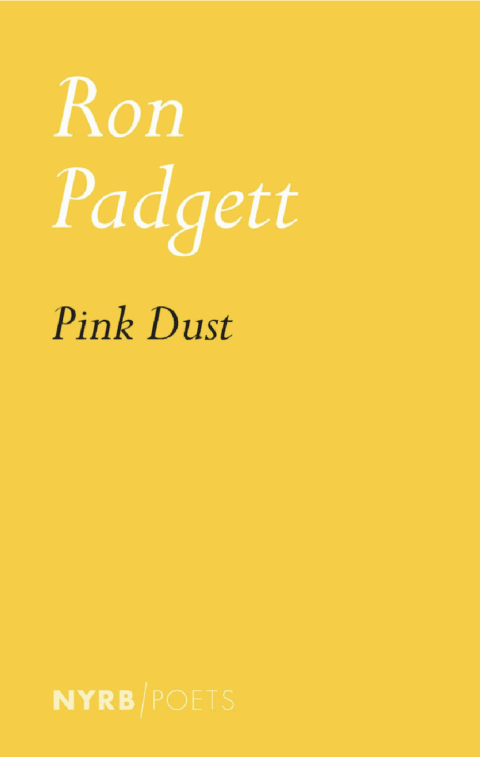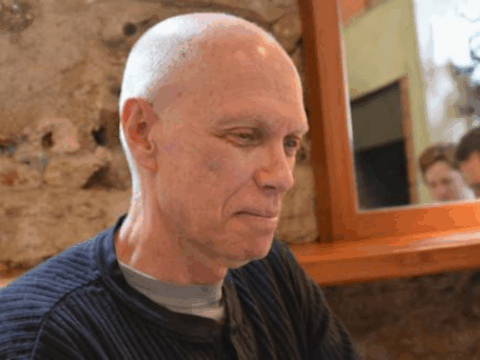When I read a poem that creates a pause, a space inside of me, I will often turn and look out a window, towards whatever view is at hand. It’s like a little wedge opening a span inside the heart that was previously welded shut. But this is a rare experience — and perhaps especially for those who love poetry, it can become increasingly infrequent as our hearts harden to things that used to easily delight us. It is the rarity of this experience that made Ron Padgett’s book Pink Dust so much like water in the desert for me. These tiny poems, which I read back to back curled up in a chair in the library, satisfied my need for simple, funny, true, and beautiful sentiments, wrapped in small boxes of words. I turned my eyes upward after reading each poem, staring out of the small arched windows of the library, marveling at the pink sunset forming outside. Perhaps “poetry makes nothing happen,” but intuitively I could feel what poetry does for Padgett, how much the need for intimate address and thoughtful communion was whirring in the engines of these concise poems.
 Over the course of his long career, a certain humility and unabashed yet modest inventiveness have characterized Padgett’s work. As John Yau writes in a review of Padgett’s Collected Poems (2013), “His writing isn’t traditionalist, surrealist, avant-gardist, minimalist, metaphysical, pataphysical, philosophical, scientific, conceptual, extravagant, obscure, metaphorical, or riddled with puns. While he has a huge bag of tricks, particularly in the early books … he seems never to rely on a particular device — collage, for example — to generate work over a long period.” There is a paring back of artifices and stances and selfhood (although, as Yau says, Padgett’s work has used its fair share of artificial quirks and devices over the years) that has guided the poetry since Padgett’s earliest publications. This continues to be true, and within the pages of Pink Dust there is a further kind of winnowing. The poems in Pink Dust are uniformly brief, and comprehensible in an uncommon way. These qualities of brevity and clarity, along with a jovial, conversational tenor, have been present throughout Padgett’s career, but are polished to a gleam in this book.
Over the course of his long career, a certain humility and unabashed yet modest inventiveness have characterized Padgett’s work. As John Yau writes in a review of Padgett’s Collected Poems (2013), “His writing isn’t traditionalist, surrealist, avant-gardist, minimalist, metaphysical, pataphysical, philosophical, scientific, conceptual, extravagant, obscure, metaphorical, or riddled with puns. While he has a huge bag of tricks, particularly in the early books … he seems never to rely on a particular device — collage, for example — to generate work over a long period.” There is a paring back of artifices and stances and selfhood (although, as Yau says, Padgett’s work has used its fair share of artificial quirks and devices over the years) that has guided the poetry since Padgett’s earliest publications. This continues to be true, and within the pages of Pink Dust there is a further kind of winnowing. The poems in Pink Dust are uniformly brief, and comprehensible in an uncommon way. These qualities of brevity and clarity, along with a jovial, conversational tenor, have been present throughout Padgett’s career, but are polished to a gleam in this book.
Pink Dust is “about” many things (and about nothing, of course), but its most poignant drive is the drive of aging, the awareness of death, and a kind of rising calm and good humor in the face of it. Here’s one view:
You get to a certain age
and you start sitting around
waiting
for the future,
as now there’s no reason
to rush toward it
as you did when you didn’t think
it existed, not really,
and now, funny thing,
soon enough you’ll be right.
It’s that conversational pacing, and the interjection — “funny thing” — that give this such poignancy. The lack of a premonition about the future that accompanies death here becomes an intimate mystery and a “funny thing.” A bemused tenderness wills the speaker. As one who still believes that the future looms and that I can push headlong into and plan for it, I was stopped in my tracks by this poem. “Soon enough you’ll be right,” the speaker says, and we come to realize there’s not much solace to take in being right, ever, about anything:
I just took out a ruler
and measured the dictionary
that I had guessed was 7 x 5 x 2 inches
and guess what?
It was.
I banged the ruler
on the desk and called out
“Yes! Yes! Yes!”
Ah, the small, sad pleasure
of being right.
The pleasure of being right, as we can see, pales dismally when compared to adjacent, deeper pleasures. This poem is accompanied by another about the 7 x 5 x 2-inch dictionary, which Padgett seems to have owned for the past 63 years:
A snap
of the fingers and here you are,
63 years later, holding 70 cubic inches
that hold you in their embrace.
A love for and curiosity about language drives these poems, as well as a delight in beauty that seems to be increasingly simplified and satisfying for the aging poet. There are several comparisons of youth and age, but Padgett never suggests that one stage of being is preferable; there is neither a painful nostalgia for lost fires, nor a belief in increased vision and wisdom with age. There is chatty, thoughtful joviality and simple kindness for the young man Padgett was, and for the old man he is now. And sympathy for all of the drives of life and death, of closeness and distance, of humor and seriousness that spur one on over a lifetime, manifesting in so many different modes:
When I was a sensitive adolescent
pink clouds in a blue sky sent me
into a cylinder of pleasure,
but now that I’m old
I see them and,
as if they were peasants
walking along a country lane,
I simply nod, happy enough
just to see them,
with no cylinder involved.
Poet and critic John Yau has pointed out Padgett’s similarity to the 8th-century Chinese poet, Du Fu, whose poems also contain a humorous intimacy and tenderness about the poet’s aging. Du Fu’s nature poems often comprise meditations on old age, as well visual sightlines, like Padgett’s cylinder, as the poet looks up at clouds moving. Both Padgett and Du Fu age softly yet hungrily in a world that seems to be natural, personal, and private, detached from the political turmoil of their times. Here’s Du Fu:
Since spring has come, I’m always up early:
my secluded affairs really occupy me.
I add rocks to prevent the bank from crumbling,
thin the grove to bring out the distant mountains.
(“Up Early,” translation by Lucas Rambo Bender, Du Fu Transforms: Poetry and Ethics amid Societal Collapse [Cambridge, Mass.: Harvard University Asia Center, 2021], p.183.)
 The affinity to Du Fu may inform this apparent lack of politics in the poems. Du Fu lived in times of great political turmoil. Starting life as a political bureaucrat, he was ultimately banished from city life by military upheavals and government instability. His later poetry, while ostensibly nature poetry and poetry about aging, contains the implicit press of this political life, and of the continued instability of the public sphere from which Du Fu had withdrawn.
The affinity to Du Fu may inform this apparent lack of politics in the poems. Du Fu lived in times of great political turmoil. Starting life as a political bureaucrat, he was ultimately banished from city life by military upheavals and government instability. His later poetry, while ostensibly nature poetry and poetry about aging, contains the implicit press of this political life, and of the continued instability of the public sphere from which Du Fu had withdrawn.
A similar dynamic seems to be at play in Padgett’s work, which is removed from the political, or from those more tumultuous aspects of public life in a studied and thorough way. Nonetheless, the implicit press of ethical claims is strong. A kind of compressed Whitmanian vision arises through these tiny poems at times, and it is exactly Padgett’s spareness, humor, and lack of grandiosity that give these moments such power:
There has to be something
I can tell you that
will make you happy
with the idea of being alive,
O citizens. I feel it
somewhere in my body,
where I don’t know.
If only my body could disappear,
that one thing
would drop onto the ground,
where you could pick it up
and stare at its words
written in a language
no one understands
but which brings joy,
a quiet, crazy joy without end.
Padgett’s poetry, though often private and personal in tone, is not lonely, not isolated. He speaks, even just for single striking moments, to a citizenry that is listening for a “language/ no one understands” and the “quiet, crazy joy without end” that accompanies it. Pink Dust contains an ethical heart, a conviction of purpose filtered through these oddly contemplative jokes and musings. Within the jewel-boxes of these poems there is a strengthening liquor — something of kindness, humor, and devotion that I certainly needed.
[Published by NYRB Books on March 11, 2025, 128 pages, $16.00 paperback]